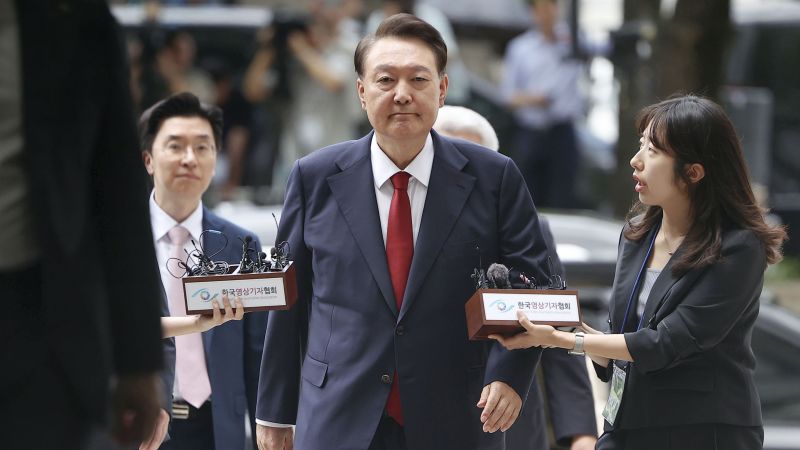North Korea's Rejection of Peace Talks
Introduction
The relationship between North and South Korea has been tense for decades, with little progress made towards peace and cooperation. However, the recent election of South Korea's new liberal president, Moon Jae-in, offered a glimmer of hope for improved relations. However, it seems that North Korea's influential leader Kim Jong Un's sister, Kim Yo Jong, is not interested in any sort of outreach from the new administration.
Key Details
In a statement released by North Korean state media, Kim Yo Jong made it clear that the country has no interest in engaging in talks with South Korea, regardless of any proposals put forth. This rejection comes as a surprise, as many had hoped that Moon Jae-in's more progressive approach would lead to a more open dialogue between the two nations.
This is not the first time that North Korea has rejected attempts at communication from South Korea. In fact, since 2007, there have been multiple attempts to hold peace talks between the two countries, all of which have been met with resistance or outright refusal from North Korea.
Impact
This latest rejection by Kim Yo Jong is a reminder of the deep-seated animosity and mistrust between North and South Korea. It also highlights the challenges that the new South Korean government will face in trying to improve relations with their northern neighbor. With tensions between North Korea and the
About the People Mentioned
Kim Jong Un
Kim Jong Un is the Supreme Leader of North Korea, having assumed power in December 2011 after the death of his father, Kim Jong Il. Born on January 8, 1983 or 1984, he is the third son of Kim Jong Il and Ko Yong-hui. Kim Jong Un was educated partly in Switzerland before returning to North Korea and being groomed for leadership, officially introduced to the public in 2010 as the designated successor[1][2][3][6]. Upon succession, Kim Jong Un inherited control over the world's fourth-largest military and a nuclear arsenal. Early in his rule, he consolidated power by purging rivals and reinforcing his authority within the Korean Workers’ Party and the military. By 2012, he held several key titles including first secretary of the Workers' Party, chairman of the Central Military Commission, and chairman of the National Defense Commission. In 2016, constitutional changes established the State Affairs Commission, headed by Kim, as the most powerful governing body in North Korea[3]. His leadership is marked by a policy known as *byungjin*, emphasizing simultaneous development of the economy and nuclear weapons. Under Kim, North Korea has conducted multiple nuclear and missile tests, escalating tensions internationally. However, he has also engaged in historic diplomacy, including summits with South Korean President Moon Jae-in and U.S. President Donald Trump in 2018, though relations remain strained[2][3]. Kim Jong Un maintains a highly secretive and authoritarian regime characterized by strict control over society and the suppression of dissent. Reports note his ruthless consolidation of power, including the alleged assassination of his half-brother Kim Jong Nam in 2017. His regime sustains a strong cult of personality similar to those of his predecessors[1][2][5]. Recently, Kim has participated in international diplomacy, including a visit to Russia amid ongoing global tensions. Despite these efforts, North Korea remains isolated, with ongoing sanctions and international scrutiny focused on its nuclear ambitions and human rights record[2].
About the Organizations Mentioned
North Korean state media
North Korean state media is a strictly controlled government apparatus used primarily for propaganda and ideological dissemination within the Democratic People’s Republic of Korea (DPRK). All media outlets, including television, radio, newspapers, and online platforms, are state-owned and operated under the ruling Workers' Party. Journalists must be party members, and content is tightly regulated to promote the regime’s narratives, glorify its leadership, and suppress dissent or criticism. Foreign media access is banned, and citizens face severe penalties for consuming outside information[1][2][6]. Historically, North Korean state media has evolved as an instrument to reinforce the government’s control over information, presenting an idealized version of life in the country while ignoring domestic problems. Key outlets include Korean Central Television (KCTV), Korean Central News Agency (KCNA)—the official news agency—and the Pyongyang Times, an English-language newspaper launched in 1965. The media’s style is often characterized by dramatic and fervent delivery, especially in news broadcasts praising the leadership or condemning perceived enemies[2][7]. Technologically, North Korea has introduced innovations such as the Manbang streaming service launched in 2016, offering live and on-demand state content over the internet—though access remains restricted to approved users. The state media also employs a “Third Broadcast,” a closed cable radio network inaccessible from outside the country, to share sensitive information domestically[2][3]. In recent years, state media has shown a somewhat subdued tone in reporting, focusing on showcasing regime achievements like nuclear and missile tests without overtly hostile rhetoric. For example, in 2025, KCNA highlighted successful hypersonic weapon tests with pride in scientific progress while downplaying threats to neighbors, signaling a tactical shift in messaging[5]. North Korean state media remains one of the world’s most tightly controlled information environments, functioning as a vital tool of regime stability, ideological control, and international signaling. It reflects the intersection of authoritarian governance, propaganda, and selective









